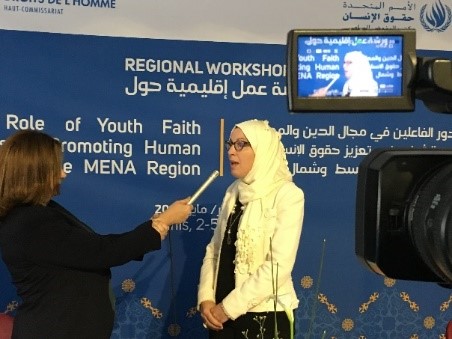Scenario A: A case to debate on blasphemy charges
#Faith4Rights toolkit
| Adam is a born-Muslim student in his twenties in a country whose population is 80 % Muslims and 20 % Christians. He started losing faith in his inherited beliefs due to what he considered to be extreme and illogical discourses of some of his country’s religious leaders. His family members and his friends were alarmed by this change and tried to counter his doubts. Feeling the pressure from his entourage, Adam posted a long post on his Facebook page, which was only accessible to his Facebook friends. In the post, he declared that he had become an atheist and explained why Islam was not convincing for him anymore. His post was shared on a large scale by some of his Facebook friends. A local newspaper published his name and wrote an article about him, depicting his actions as “an insult Islam that constituted an offense to believers”. In a TV debate, a well-known Sheikh declared him to be an apostate (murtad) and called upon the formal religious authorities to take action. Following this, Adam was physically harassed and verbally attacked and threatened by his neighbours and by some strangers in public places. When Adam tried to file a police complaint against some persons who attacked him, the police arrested him and accused him of disrespect and contempt of Islam. Adam is sentenced to one year in prison under his country’s blasphemy law. |
Assignment: Teams shall argue which actions may have violated any of the 18 commitments?
A tip for facilitators
During the fourth phase, the facilitator could make use of questions that he or she would have prepared in advance to animate the debate. The facilitator would draw the attention of participants to points they may have omitted in their preparation of the list of questions defined during their group discussion (in phase two).
A sample of questions related to this case could include the following:
- Is there a difference between criticizing a religion and questioning doctrines based upon them? Does criticising human interpretation of religion equal criticising religions?
- Where is the demarcation line between the dogma itself and its human interpretation? What principles, in law or in religious tradition, define that often thin line?
- Are satirical expressions in relation to religious figures and sacred texts acceptable? What are the criteria of acceptability: the law, religion or morality? Is satire acceptable in principle or rejected in principle as an artistic expression in the religious sphere? What do international norms stipulate in this respect?
- How can we assess anti-blasphemy laws in principle? How do they stand in international human rights law and, comparatively, in your own faith tradition?
- How can we determine if there is a case of blasphemy? How are anti-blasphemy laws misused and violate freedom of religion or belief and freedom of expression? Does freedom of religion include the right not to be religiously insulted or offended?
- What is the role of the Government in protecting freedom of expression and freedom of religion or belief?
- The facilitator may insert some modifications to the scenario, for instance:
- Would the outcome of the case change if Adam was a Christian doing the same thing in the same country, i.e. renouncing his faith to become an atheist?
- What would you say if he was a Muslim in a country with a majority of Christians?
- How would the case be different if Adam announced that he became a Christian and not an atheist?
- How would you apply the six-part threshold test offered by the Rabat Plan of Action on this particular case with a view to determining if Adam or the Sheikh had crossed the line of incitement to hatred?
- The six-part threshold test relates to: the context, the status or position of the speaker, the intent behind the message, the content, how widely the message is spread and the degree of risk that the message will actually provoke and lead to violent action. Could these criteria be used also for blasphemy?
- Should their conduct be considered in a civil case or should they be criminally prosecuted, if at all? (i.e. the question of proportionality).
- Participants may wish to check the online guides and calculators for analysing hate speech at: https://pjp-eu.coe.int/en/web/human-rights-speech/analyse
Additional ideas for facilitators:
The facilitator could also refer to the open letter by High Commissioner Volker Türk of 5 November 2022, who called for Twitter’s content moderation policies to continue barring hatred that incites discrimination, hostility or violence on the platform, and he stressed that “hate speech has spread like wildfire on social media platforms in countries with starkly different cultural, political and religious contexts – with horrific, life-threatening consequences for thousands of people.”
